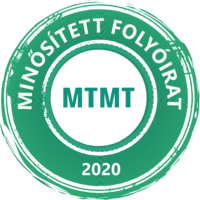Development of an IoT based 3D printed Mobile Robot Platform for training of Mechatronics Engineering Students
DOI:
https://doi.org/10.14232/analecta.2024.1.18-30Keywords:
3D print, STEM, IoT, Multi-robot systemsAbstract
The advent of the Internet of Things (IoT) has opened up new opportunities in education, particularly in the field of mobile robotics. Mobile robotics is a fast-growing field, and with the increasing demand for skilled robotics engineers, it is essential to provide students with hands-on experience in designing and developing robots. In this regard, an IoT-based 3D printed mobile robot platform has been developed for students training. STEM (Science, Technology, Engineering, and Mathematics) education has been gaining attention as a means to improve science and engineering education. STEM education aims to foster critical thinking, problem-solving skills, creativity, and innovation among students. It involves an educational policy that aims to develop the next generation of skilled professionals by integrating the fields of Science, Technology, Engineering and Mathematics. The goal of this approach is to provide students in mechatronics, who are assigned to the robotics lab during their studies, an up to date knowledge and experience in research and development activities. Thus, this paper aims to provide education that focuses on the acquisition and application of engineering knowledge, including control engineering, mechanical engineering, electrical and electronic engineering, information engineering, among others, with the main focus on mobile robot research.
Downloads
References
Wang, S., Jiang, L., Meng, J., Xie, Y., & Ding, H. (2021). Training for smart manufacturing using a mobile robot-based production line. Frontiers of Mechanical Engineering, 16, 249-270. https://doi.org/10.1007/s11465-020-0625-z
Cao, P., Strawson, J., Zhu, X., Zhou, E., Lazar, C., Meyer, D., ... & Kuester, F. (2022). Beaglerover: An open-source 3D-printable robotic platform for engineering education and research. In AIAA SCITECH 2022 Forum (p. 1914). https://doi.org/10.2514/6.2022-1914
Vlasov, A. I., Yudin, A. V., Shakhnov, V. A., Usov, K. A., & Salmina, M. A. (2017). Design methods of teaching the development of internet of things components with considering predictive maintenance on the basis of mechatronic devices. International Journal of Applied Engineering Research, 12(20), 9390-9396.
Vega, J., & Cañas, J. M. (2018). PiBot: An open low-cost robotic platform with camera for STEM education. Electronics, 7(12), 430. https://doi.org/10.3390/electronics7120430
Louw, L., & Deacon, Q. (2020). Teaching Industrie 4.0 technologies in a learning factory through problem-based learning: Case study of a semi-automated robotic cell design. Procedia Manufacturing, 45, 265-270. https://doi.org/10.1016/j.promfg.2020.04.105
Gonçalves, J., Lima, J., Brito, T., Brancalião, L., Camargo, C., Oliveira, V., & Conde, M. Á. (2019, October). Educational Robotics Summer Camp at IPB: A Challenge based learning case study. In Proceedings of the Seventh International Conference on Technological Ecosystems for Enhancing Multiculturality (pp. 36-43). https://doi.org/10.1145/3362789.3362910
Ford, S., & Minshall, T. (2019). Invited review article: Where and how 3D printing is used in teaching and education. Additive Manufacturing, 25, 131-150. https://doi.org/10.1016/j.addma.2018.10.028
Abdullahi, A. Y., Hamza, M. F., & Isa, A. I. (2022). A survey on the contributions of 3d printing to robotics education—A decade review. Recent Trends in Mechatronics Towards Industry 4.0: Selected Articles from iM3F 2020, Malaysia, 289-302. https://doi.org/10.1007/978-981-33-4597-3_27
Pérula-Martínez, R., García-Haro, J. M., Balaguer, C., & Salichs, M. A. (2016). Developing Educational Printable Robots to Motivate University Students Using Open Source Technologies. Journal of Intelligent & Robotic Systems, 81, 25-39. https://doi.org/10.1007/s10846-015-0205-3
Armesto, L., Fuentes-Durá, P., & Perry, D. (2016). Low-cost printable robots in education. Journal of Intelligent & Robotic Systems, 81, 5-24. https://doi.org/10.1007/s10846-015-0199-x
Gonçalves, J., & Costa, P. (2017, July). Differential mobile robot controller study: A low cost experiment based on a small arduino based prototype. In 2017 25th Mediterranean Conference on Control and Automation (MED) (pp. 945-950). IEEE. https://doi.org/10.1109/MED.2017.7984241
Kleppe, P. S., Bjelland, Ø., Hansen, I. E., & Mork, O. J. (2022, March). Idea Lab: Bridging Product Design and Automatic Manufacturing in Engineering Education 4.0. In 2022 IEEE Global Engineering Education Conference (EDUCON) (pp. 195-200). IEEE. https://doi.org/10.1109/ EDUCON52537.2022.9766542
Elbestawi, M., Centea, D., Singh, I., & Wanyama, T. (2018). SEPT learning factory for industry 4.0 education and applied research. Procedia manufacturing, 23, 249-254. https://doi.org/10.1016/j.promfg.2018.04.025
Hernandez-de-Menendez, M., Escobar Díaz, C. A., & Morales-Menendez, R. (2020). Engineering education for smart 4.0 technology: a review. International Journal on Interactive Design and Manufacturing (IJIDeM), 14, 789-803. https://doi.org/10.1007/s12008-020-00672-x
Arvin, F., Espinosa, J., Bird, B., West, A., Watson, S., & Lennox, B. (2019). Mona: an affordable open-source mobile robot for education and research. Journal of Intelligent & Robotic Systems, 94, 761-775. https://doi.org/10.1007/s10846-018-0866-9
Kotarski, D., Piljek, P., Pranjić, M., Grlj, C. G., & Kasać, J. (2021). A modular multirotor unmanned aerial vehicle design approach for development of an engineering education platform. Sensors, 21(8), 2737. https://doi.org/10.3390/s21082737
Mészáros, A., & Sárosi, J. (2022). Soft Robotics: State of Art and Outlook. Analecta Technica Szegedinensia, 16(1), 8-13. https://doi.org/10.14232/analecta.2022.1.8-13
Sarcevic, P., Csik, D., & Odry, A. (2023). Indoor 2D Positioning Method for Mobile Robots Based on the Fusion of RSSI and Magnetometer Fingerprints. Sensors, 23(4), 1855. https://doi.org/10.3390/s23041855
Downloads
Published
How to Cite
Issue
Section
License
Copyright (c) 2024 János Simon, László Gogolák

This work is licensed under a Creative Commons Attribution 4.0 International License.
Copyright (C) 2024 Authors
This work is licensed under a Creative Commons Attribution 4.0 International License.













